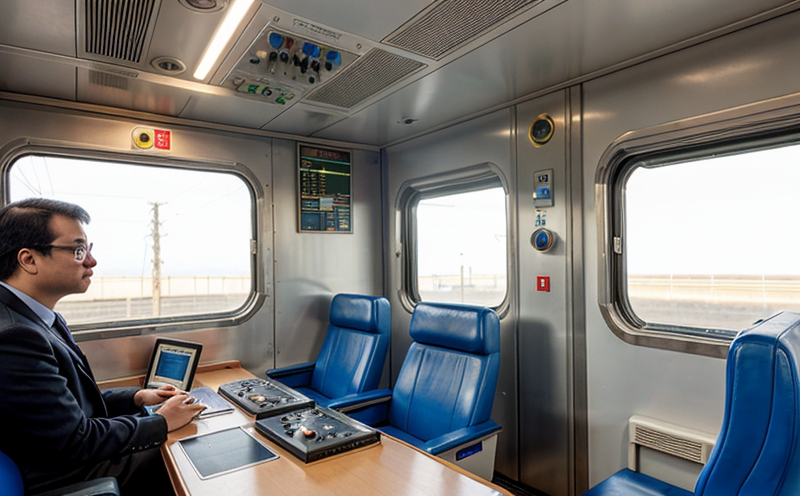Evaluation of EMI in Train Control Systems
Unlocking Safe and Efficient Train Control Systems The Importance of EMI Evaluation
In the realm of transportation, particularly in rail systems, safety is paramount. A train control systems primary function is to ensure the safe movement of trains while maintaining efficient operations. However, these systems are not immune to electromagnetic interference (EMI), which can compromise their performance and pose significant risks. To mitigate such threats, companies rely on expert evaluations to guarantee their train control systems operate flawlessly.
What is EMI Evaluation in Train Control Systems?
Electromagnetic Interference (EMI) evaluation in train control systems refers to the process of identifying, analyzing, and mitigating electromagnetic disturbances that can affect a systems functionality. Eurolab offers a comprehensive laboratory service designed specifically for the rail industry, aimed at ensuring train control systems meet stringent safety standards.
Why is EMI Evaluation Crucial for Train Control Systems?
The correct functioning of train control systems is critical to preventing accidents and ensuring passenger safety. EMI can interfere with the systems communication between trains and control centers, leading to incorrect speed readings, signal misinterpretations, or even complete loss of control. This is why a thorough EMI evaluation is indispensable for businesses operating in the rail sector.
Benefits of Using EMI Evaluation in Train Control Systems
Enhanced Safety By identifying and mitigating EMI risks, you can ensure that your train control systems operate safely, reducing the likelihood of accidents and protecting passengers.
Improved Efficiency A robust evaluation process helps optimize system performance, ensuring smooth communication between trains and control centers, which translates to increased operational efficiency.
Compliance with Regulations Regular EMI evaluations help companies meet regulatory requirements, such as those set by industry standards organizations like EN 50121 for electromagnetic compatibility in railway applications.
Reduced Downtime Early identification of potential issues allows for proactive maintenance, minimizing the risk of unexpected downtime and reducing operational costs.
Cost Savings While it may seem counterintuitive, investing in EMI evaluation can save your company money in the long run. By identifying and addressing issues early on, you can prevent costly repairs and replacements down the line.
Increased Confidence A thorough EMI evaluation process provides assurance that your train control systems are operating within safety guidelines, giving you peace of mind and confidence in your operations.
Future-Proofing As technology continues to evolve, EMI evaluations help ensure your systems remain compatible with new advancements. This forward-thinking approach safeguards your investment for years to come.
Competitive Advantage Companies that prioritize EMI evaluation can differentiate themselves as industry leaders, demonstrating a commitment to safety and efficiency.
Frequently Asked Questions (FAQs)
What is the purpose of EMI evaluation in train control systems?
The primary goal of EMI evaluation is to ensure electromagnetic compatibility within railway environments, guaranteeing safe and efficient operations.
How does Eurolab conduct EMI evaluations for train control systems?
Our team of experts employs state-of-the-art equipment and methodologies to thoroughly assess your systems susceptibility to electromagnetic interference. We provide detailed reports outlining findings and recommendations for improvement.
What are the key factors that can cause EMI in train control systems?
Sources of EMI include radio frequency signals from nearby communication devices, high-voltage power lines, and even internal system components.
Can EMI evaluation be performed on existing train control systems?
Yes, our services are tailored to accommodate existing as well as new installations. We assess your systems current configuration and provide recommendations for modification or upgrade if necessary.
Is EMI evaluation a requirement by law in the rail industry?
While it is not mandatory, regulatory compliance with standards like EN 50121 necessitates regular EMI evaluations to ensure electromagnetic compatibility within railway applications.
How often should EMI evaluations be conducted for train control systems?
The frequency of evaluations depends on various factors, including system upgrades, changes in operational environments, or the manufacturers recommendations. Regular assessments help maintain safety standards and prevent potential issues from arising.
Can Eurolab assist with implementing mitigation strategies for identified EMI risks?
Our comprehensive service includes not only evaluation but also offering practical advice and solutions to address any electromagnetic interference concerns. This helps ensure your systems operate within regulatory guidelines.
In conclusion, the Evaluation of EMI in Train Control Systems is a critical component of maintaining safety and efficiency within the rail industry. By partnering with Eurolab for expert assessments and recommendations, businesses can rest assured that their train control systems are operating at optimal levels while adhering to stringent regulations.




